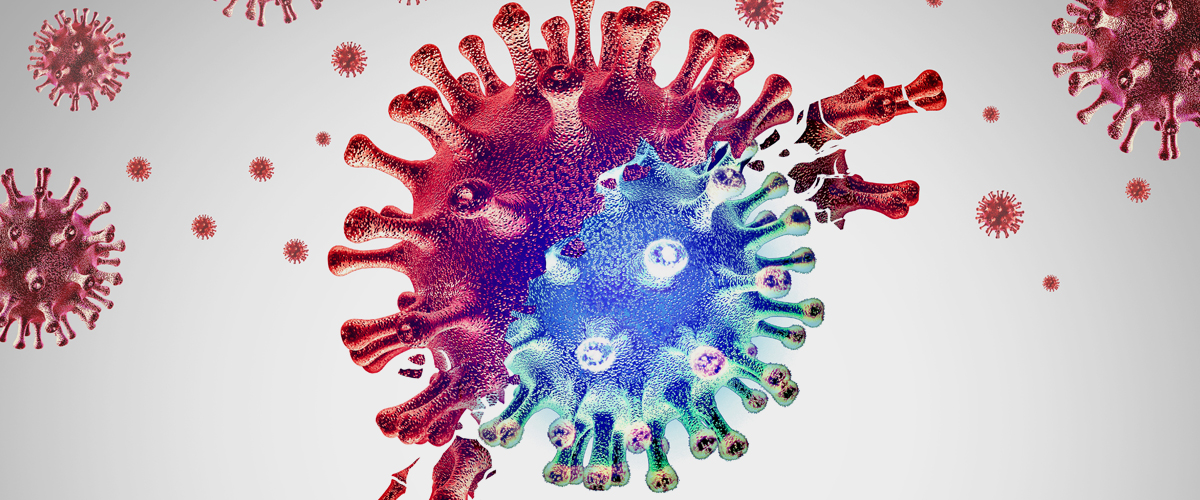Omicron Subvariant XBB.1.5: What to Know
An infectious diseases specialist shares what to know about XBB.1.5, the latest variant to take hold in the United States.

The new Omicron subvariant, XBB.1.5, has been spreading quickly in the United States. But a new study released by the Centers for Disease Control and Prevention (CDC) on January 25 shows that the COVID-19 bivalent booster reduces the risk of symptomatic infection from XBB.1.5 by about 40% to 50%.
The continuing mutations of SARS-COV-2 — the cause of COVID-19 infections — have led to new variants and subvariants like XBB.1.5 and have been associated with increased transmission rates. For the week ending on January 21, CDC forecasted that the subvariant will account for 49.1% of COVID-19 cases across the country, and more than 85% in the Northeast. “XBB.1.5 is currently the most transmissible variant,” says Dr. Roy M. Gulick, an attending physician and Chief of the Division of Infectious Diseases at NewYork-Presbyterian/Weill Cornell Medical Center.
The symptoms are similar to previous variants, he says, although sore throat appears to be more common. “In general, Omicron causes less severe illness, so shortness of breath and the need for oxygen or hospitalization is less common,” Dr. Gulick added, who is also the Rochelle Belfer Professor in Medicine at Weill Cornell Medicine.
Dr. Gulick explains what to know about the latest subvariant.

Dr. Roy M. Gulick
Is there a difference between this subvariant and others?
Dr. Gulick: This subvariant has more mutations, binds tighter to human cells, and is more transmissible than prior variants and subvariants. XBB.1.5 is now the predominant COVID-19 virus across the U.S., particularly in the Northeast.
Will vaccines and boosters provide protection against XBB.1.5 and help lessen the symptoms?
We are still learning how well the vaccines and boosters protect against XBB.1.5, but the new CDC study shows that the COVID-19 bivalent booster reduces the risk of symptomatic infection by about 40% to 50%. Other parts of the immune system may also help protect against the progression to severe disease.
Is infection with the subvariant a bigger concern for immunocompromised people or those who do not have a strong immune response to the vaccine and booster?
People with compromised immune systems and those not fully responsive to vaccines and boosters may have an increased risk of acquiring the subvariant and experiencing the progression of COVID-19. Those who are at increased risk and who develop mild-moderate symptomatic COVID-19 should consult with their healthcare provider to ask about taking COVID-19 antivirals, such as nirmatrelvir/ritonavir (Paxlovid) or remdesivir. These drugs have been shown to reduce the rate of COVID-19 disease progression such as the need for hospitalization and remain active against the new variants and subvariants.
What measures can people take to protect themselves?
We are returning to some of the measures we recommended early in the pandemic, such as wearing masks in crowded, poorly-ventilated places (e.g. public transportation, some restaurants) or avoiding them. If people develop upper respiratory symptoms, such as a sore throat, cough, and fever, they should test for COVID-19 and if positive, should self-isolate to prevent transmission to others.
People should also remember that home tests can be “falsely” negative in the first one to two days of illness, so a negative home test should be repeated in a few days. Finally, people at risk for progression because of older age, compromised immune systems, pregnancy, obesity, or a serious illness, such as diabetes, heart disease, or lung disease, should consult with their healthcare provider about taking COVID-19 antivirals.
We know that vaccination and up-to-date boosting is the best way to avoid the most serious complications of COVID-19, including hospitalization and death. People should make sure they are up to date.
Roy M. Gulick, M.D., is an attending physician at NewYork-Presbyterian/Weill Cornell Medical Center who specializes in infectious diseases. Dr. Gulick’s research interests include designing, conducting, and analyzing clinical trials to test new agents and refine therapy strategies for COVID-19. He currently serves as a co-chair of the National Institutes of Health’s COVID-19 Treatment Guidelines Panel. Dr. Gulick also serves as the Rochelle Belfer Professor in Medicine at Weill Cornell Medicine and is Chief of the Division of Infectious Diseases at NewYork-Presbyterian/Weill Cornell Medical Center.
